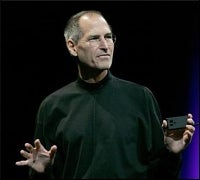 |
| Source: Reuters |
Apple (NASDAQ: AAPL) Chief Executive Steve Jobs underwent a liver transplant operation about two months ago and is expected to return to work by the end of June, The Wall Street Journal reported on Saturday.
Jobs, a pancreatic cancer survivor, has been away on medical leave since January for an undisclosed condition.
An Apple spokesman did not confirm the Journal report but said, “Steve continues to look forward to returning to Apple at the end of June and there is nothing further to say.”
The Journal, citing an unnamed source, said Jobs may return to work part-time at first.
Apple has been dogged for months by rumors about Jobs’ health. Some shareholders in the past have complained about the company’s lack of disclosure about the well-being of its CEO.
But Erick Maronak, chief investment officer for the Victory Large Cap Growth Fund, said investors are less concerned these days than they once were because other Apple executives have stepped to the forefront in Jobs’ absence.
“I think people are beginning to focus on core operations… I don’t think he’s as important in terms of near-term volatility,” said Maronak, whose fund held 1.5 million Apple shares at the end of 2008.
“My expectation was that he’d be back in the office… Hopefully, this doesn’t change his schedule.”
Analysts have said Wall Street is prepared for Jobs, 54, to shift to a new role that would allow him to focus on big-picture issues and products while Chief Operating Officer Tim Cook manages the day-to-day.
Jobs is widely seen as the driving force behind Apple’s famed innovation machine, which has produced category-defining products such as the iPod and the iPhone. On Friday, it launched the latest iPhone, the 3G S.
Rare form of pancreatic cancer
In 2004, Jobs was treated for a rare type of pancreatic cancer called an islet-cell, or neuroendocrine, tumor. Such tumors can be benign or malignant but they usually grow slowly and are far less deadly than most pancreatic tumors.
Like many cancers, pancreatic cancer often spreads to the liver, although it is not clear why Jobs may have gotten a transplant — if it was because his pancreatic cancer had spread or for some other reason.
Liver transplants are becoming more common — 6,649 were performed in 2006 — and Jobs’ odds are good if he had one. Seventy percent of liver transplant patients are still alive three years later, according to United Network for Organ Sharing.
The Journal report said Jobs received the liver transplant in Tennessee and that at least some of Apple’s directors were aware of the surgery.
Nationally, 15,771 people are waiting for liver transplants, according to The Organ Procurement and Transplantation Network of the U.S. Department of Health and Human Services.
Waiting list times vary by states. The United Network for Organ Sharing said the wait has improved because of a new system that allocates livers based on who needs them the most instead of on how long a patient has been waiting.
Jobs’ gaunt appearance at an Apple event in the summer of 2008 touched off speculation about his health, fueled by the crush of Apple blogs and fans that follow his every move.
In January, Jobs sent a letter to employees, blaming his weight loss on a hormone imbalance, and said he would continue as CEO as he received treatment. Nine days later, he announced his medical leave, saying his health-related issues were “more complex” than he had originally thought.
He has not been heard from since then, although various reports, sightings and rumors put him at Apple’s campus in Cupertino, Calif., periodically.
While Cook took over day-to-day responsibilities at Apple, the company has said Jobs remained deeply involved in decision-making.


